Sindh govt to seize banned outfits’ facilities
Amid uproar, assembly passes bills in line with FATF recommendations
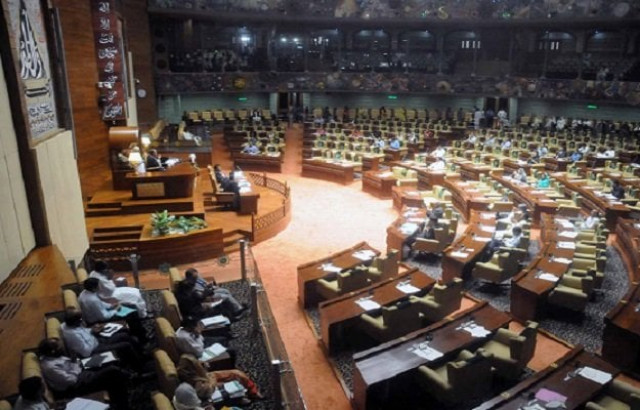
The Sindh Assembly passed two different bills on Friday permitting the provincial government to take administrative control of schools, seminaries and health facilities run by banned outfits.
The session, marred by protests and an opposition walk-out over a bill pertaining to the creation of a seventh district in Karachi, began with deputy speaker Rehana Leghari in chair, as provincial parliamentary affairs minister Mukesh Kumar Chawla moved two bills.
The Sindh Seized and Freezed Facilities (Hospitals and Dispensaries) Bill and the Sindh Seized and Freezed Institutions (Madaris and Schools) Bill were passed after the federal interior ministry had listed Jamaatud Dawa (JuD), Falah-e-Insaniat Foundation (FIF) and other outfits as proscribed organisations in order to meet Financial Action Task Force (FATF) requirements.
Briefing the house, Chawla said the decision had been made on the Centre's directives, adding that the Sindh cabinet had already approved the bills to take over the affairs of such schools, hospitals and seminaries.
According to the newly passed legislation, these institutions would now be run by two boards, to be constituted under the provincial education and health secretaries, respectively.
While the government did not provide an official tally of the education and health facilities to be seized, officials in the Sindh government disclosed that around 56 such facilities belonged to JuD and FIF.
During the session, Chawla also presented the Sindh Waqf Properties Bill, proposed by the Auqaf and Zakat Department, for legislation.
Sindh Auqaf Minister Sohail Anwar Siyal, briefing the lawmakers about the bill, explained that it too was being passed in light of FATF recommendations. "This law is meant to prevent the misuse of funds generated from mazars and so on," he added.
Furthermore, the Sindh Cooperative Societies Bill was passed unanimously by the assembly. Provincial industries and anti-corruption minister Jam Ikramullah Dharejo stated that it was being passed in accordance with the FATF recommendation to keep a vigilant eye on society funds and prevent money laundering.
Yet another piece of legislation, the Sindh Trusts Bill, was also passed. According to this law, all trusts will now be registered with the provincial government and will have to provide details about their funding and other necessary information at the time of registration.
Opposition leaders, including Muttahida Qaumi Movement-Pakistan's (MQM-P) Khawaja Izharul Hassan and Pakistan Tehreek-e-Insaf's (PTI) Firdous Shamim Naqvi expressed dismay that opposition members had not been given copies of the bills.
"The bills are important, but the government should expedite the process to devise their rules too," Hassan pointed out.
Agreeing with him, Sindh Energy Minister Imtiaz Ahmed Shaikh said the government would make the rules soon. "The legislation is being made in haste on the federal government's advice. The same bills have also been passed by the National Assembly and Senate," he added.
Uproar over Keamari district
Meanwhile, the house witnessed hue and cry over the Sindh government's move to create a seventh district in Karachi, finally leading to MQM-P and PTI legislators walking out of the session. The previous day, the provincial cabinet had given the nod to carving out a new district, Keamari, from the already-existing West district.
The house echoed with cries of "no no" and "go go" as MQM-P and PTI MPAs insisted the city's division was unacceptable, rushing to the speaker's podium to protest in front of it.
Naqvi, calling it a district created on ethnic lines, asked the deputy speaker for permission to speak on the issue. Leghari, however, said, "I will give you the chance, but let me take up the bill first."
With Naqvi reiterating his request and Leghari's continued refusal, the opposition members walked out of the session.
Earlier, as the session started, Pakistan Peoples Party MPA Saleem Baloch drew the legislators' attention toward the murder of Hayat Baloch, a University of Karachi student, in Turbat, Balochistan. He requested the deputy speaker to enact laws to prevent the occurrence of such incidents in Sindh too.
Published in The Express Tribune, August 22nd, 2020

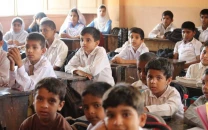
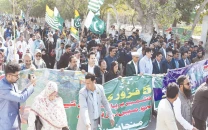
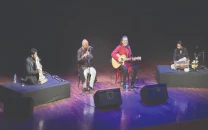

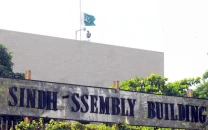













COMMENTS
Comments are moderated and generally will be posted if they are on-topic and not abusive.
For more information, please see our Comments FAQ